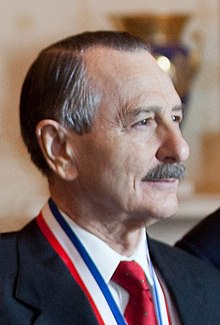Ralph L. Brinster
| Ralph L. Brinster | |
|---|---|

Brinster in October 2011.
|
|
| Born |
March 10, 1932 Montclair, New Jersey |
| Nationality | American |
| Fields | Genetics |
| Institutions | University of Pennsylvania |
| Alma mater |
Rutgers University (B.S., 1953) University of Pennsylvania (V.M.D., 1960) (Ph.D., 1964) |
| Notable awards |
Grand Prix Charles-Leopold Mayer, FRA March of Dimes Prize in Developmental Biology, United States Gairdner Foundation International Award, CAN National Medal of Science, United States |
Grand Prix Charles-Leopold Mayer, FRA
March of Dimes Prize in Developmental Biology, United States
Gairdner Foundation International Award, CAN
Ralph Lawrence Brinster is an American geneticist and Richard King Mellon Professor of Reproductive Physiology at the School of Veterinary Medicine, University of Pennsylvania.
Ralph L. Brinster grew up in a small farm in Cedar Grove, New Jersey. He studied animal science as an undergraduate at the Cook School of Agriculture, Rutgers University, New Brunswick, and completed his B.S. in 1953. He was an officer in the United States Air Force (1953–1956) and served during the Korean War. He returned from military service and earned his V.M.D. (1960) and his Ph.D. in Physiology (1964) from the University of Pennsylvania.
Ralph Brinster is acknowledged as one of the seminal founders of the field of mammalian transgenesis. He is known throughout the scientific community for his revolutionary research in embryonic-cell differentiation, developmental mechanisms of gene control, and stem cell physiology.
During the 1960s, Brinster pioneered the development of techniques to manipulate mouse embryos—his techniques have made the mouse the major genetic model for understanding the basis of human biology and disease. His research has provided the experimental foundation for progress in germline genetic modification in a range of species, which has generated a revolution in biology, medicine, and agriculture.
...
Wikipedia
